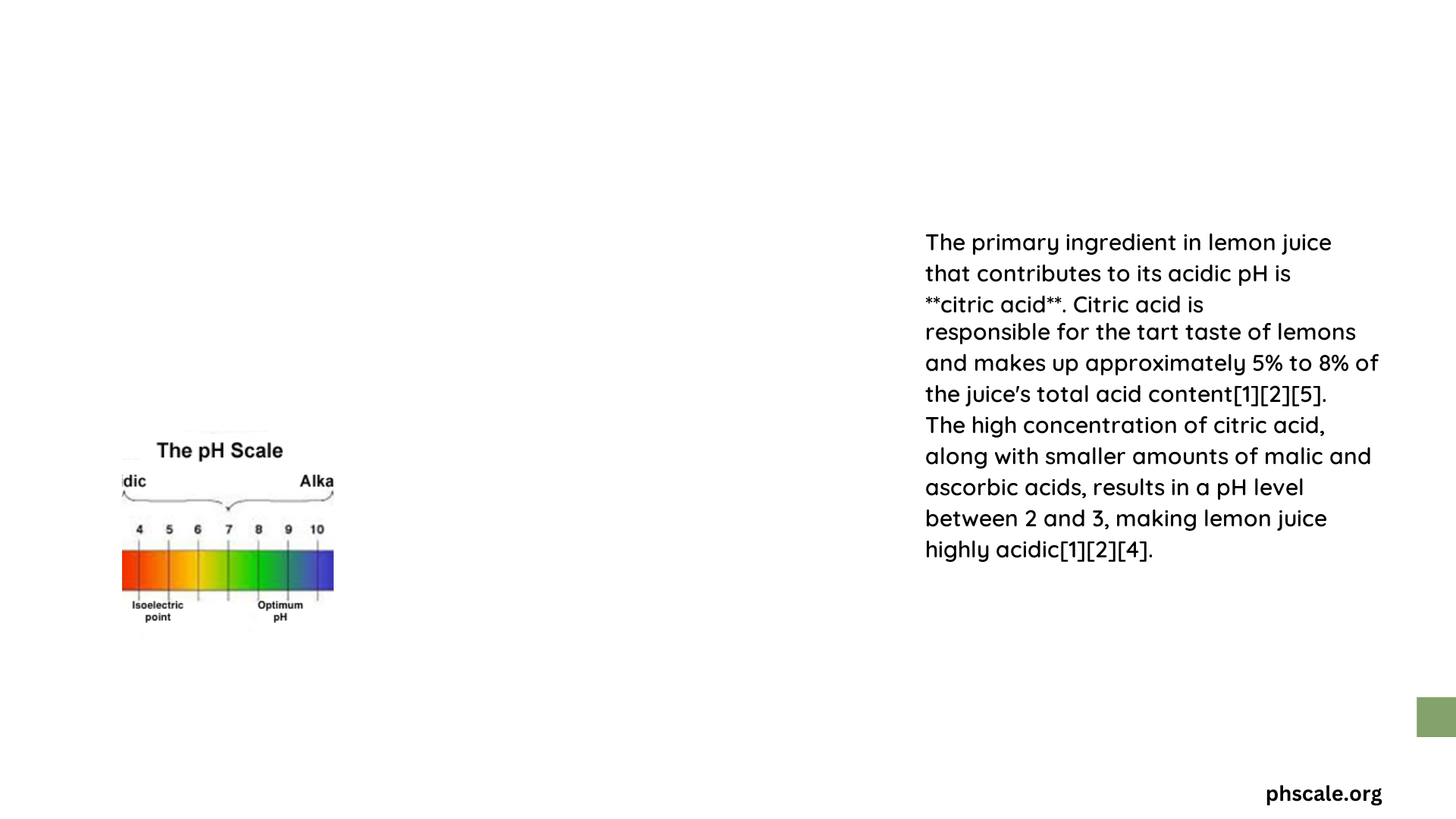Lemon juice is known for its acidic nature, with a pH typically ranging between 2 and 3. The primary ingredient responsible for this low pH is citric acid. This organic acid constitutes about 5-7% of fresh lemon juice’s composition, making it the main contributor to lemon juice’s acidity. Understanding the role of citric acid in lemon juice’s pH is crucial for various applications in cooking, food science, and even health-related discussions.
What Is the Main Acidic Component in Lemon Juice?
Citric acid (C₆H₈O₇) is the primary organic acid found in lemon juice. It’s a triprotic acid, meaning it can donate three protons (H⁺ ions) in aqueous solutions. This characteristic is key to understanding its impact on pH.
How Does Citric Acid Structure Affect Lemon Juice pH?
The molecular structure of citric acid includes three carboxyl groups, each capable of dissociating. This structure is crucial for its acidic properties:
- First carboxyl group: pKa₁ = 3.13
- Second carboxyl group: pKa₂ = 4.76
- Third carboxyl group: pKa₃ = 6.40
The first dissociation step (pKa₁) is most significant in contributing to lemon juice’s acidity due to its lower value.
What Is the Typical Concentration of Citric Acid in Lemon Juice?

The concentration of citric acid in lemon juice typically ranges from 5% to 7%. This high concentration is responsible for the juice’s characteristically low pH.
How Can We Calculate Lemon Juice pH Based on Citric Acid Concentration?
To calculate the pH of lemon juice based on its citric acid content, follow these steps:
-
Calculate H⁺ ion concentration from pH:
[H⁺] = 10^(-pH) -
Use the Ka expression for the first dissociation step:
Ka₁ = ([H⁺][H₂Cit⁻]) / [H₃Cit] -
Solve for citric acid concentration using the known Ka₁ value and estimated pH.
For example, assuming a pH of 2.1:
– [H⁺] ≈ 7.94 × 10⁻³ mol/L
– Using Ka₁ = 8.4 × 10⁻⁴, the citric acid concentration can be calculated as approximately 0.083 mol/L.
What Other Factors Influence Lemon Juice pH?
While citric acid is the primary contributor, other factors can affect lemon juice pH:
- Ripeness of lemons
- Growing conditions
- Storage methods
- Processing techniques
These factors can slightly alter the citric acid concentration and, consequently, the pH of the juice.
How Do We Measure Lemon Juice pH Accurately?
Accurate pH measurement of lemon juice involves several steps:
- Equipment needed:
- Calibrated pH meter or high-quality pH paper
- Buffer solutions for calibration
-
Fresh lemon juice sample
-
Measurement process:
a. Calibrate the pH meter using standard buffer solutions (e.g., pH 4 and 7)
b. Rinse the electrode with distilled water
c. Immerse the electrode in the lemon juice sample
d. Allow the reading to stabilize before recording -
Potential challenges:
- Ensuring proper calibration of the pH meter
- Maintaining consistent temperature during measurement
- Avoiding contamination of the sample
What Are the Implications of Lemon Juice’s Low pH?
The low pH of lemon juice, primarily due to citric acid, has several implications:
- Culinary uses:
- Flavor enhancement
- Natural food preservative
-
Meat tenderizer
-
Health considerations:
- Potential enamel erosion with excessive consumption
-
Digestive aid for some individuals
-
Industrial applications:
- Natural cleaning agent
- pH adjuster in various products
How Does Lemon Juice pH Compare to Other Citrus Fruits?
| Fruit Juice | Typical pH Range | Primary Acid |
|---|---|---|
| Lemon | 2.0 – 2.6 | Citric Acid |
| Lime | 2.0 – 2.8 | Citric Acid |
| Orange | 3.3 – 4.2 | Citric Acid |
| Grapefruit | 3.0 – 3.5 | Citric Acid |
While all citrus fruits contain citric acid, lemons and limes have the highest concentrations, resulting in lower pH values.
In conclusion, the primary ingredient in lemon juice that contributes to its low pH is citric acid. Its high concentration and molecular structure make it a potent source of acidity, giving lemon juice its characteristic tartness and numerous practical applications.
References:
1. Doubtnut – pH Calculation of Citric Acid
2. Physics Forums – Citric Acid pH Calculation
3. Healthline – Lemon Juice Acidity
